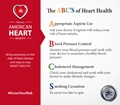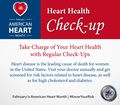February is nationally recognized as American Heart Month, a time for the DoD community to show its love for healthy living. We will promote health messages about reducing the risk of heart disease and recognizing the warning signs. Cardiovascular disease (CVD) — including heart disease, stroke, and high blood pressure — is the number one killer of men and women in the United States.
- Heart disease is a term that includes several more specific heart conditions.
- The most common heart disease in the United States is coronary heart disease, which can lead to heart attack.
Know Your Risk!
Risk factors for heart disease and stroke include:
- High blood pressure, cholesterol and glucose levels
- Smoking
- Inadequate intake of fruits and vegetables
- Overweight and obesity
- Physical inactivity
Taken together, these major risk factors account for around 80% of deaths from heart disease and stroke. The only way to know your level of risk is to be assessed by a healthcare professional and to be checked for factors such as your blood pressure, cholesterol and glucose levels, waist measurement and BMI. Once you know your overall risk, agree with your health care professional on a plan for specific actions you should take to reduce your risk for heart disease and stroke.
Related Links
You also may be interested in...
Showing results 1 - 15
Page 1 of 2
Infographic
6/8/2016

Cardiovascular disease comprises disorders of the heart and circulatory system including coronary heart disease and cerebrovascular disease. This infographic provides data on the risk factors for cardiovascular disease among military members base on diagnostic codes in the electronic health records of service members during a 10-year surveillance period.
Recommended Content:
Men's Health, Heart Health
Article
2/26/2016

Stress can take its toll on your heart health, but there are breathing techniques to buffer yourself from it
Recommended Content:
Heart Health, Operation Live Well
Article
2/25/2016

When it comes to having a healthy heart, Army Lt. Col. (Dr.) Eugene Soh, says there are different means of preventing cardiac related diseases, as well as some simple steps, that can greatly reduce the chances of a cardiac event.
Recommended Content:
Nutrition, Public Health, Heart Health
Infographic
2/22/2016

Bring awareness to the risks of heart disease and ways to stay heart healthy.
Recommended Content:
Heart Health
Article
2/22/2016

During February, the Military Health System recognizes the need for good heart health. In the fourth part in our series, we discuss those factors that people can’t control by themselves.
Recommended Content:
Heart Health, Preventive Health
Infographic
2/16/2016

Take Charge of Your Heart Health with Regular Checkups
Recommended Content:
Heart Health
Article
2/16/2016

During February, the Military Health System recognizes the need for good heart health. In the third article in our series, a healthy diet and regular exercise are explored in how each affects the heart’s health.
Recommended Content:
Heart Health, Nutrition, Physical Activity
Infographic
2/11/2016

4 ways to keep your heart healthy this Valentine's Day
Recommended Content:
Heart Health
Article
2/8/2016

During February, the Military Health System recognizes the need for good heart health. In the second article in our series, we talk about the effects tobacco has on the heart and blood vessels.
Recommended Content:
Tobacco-Free Living, Heart Health
Article
2/1/2016

Operation Live Well’s message this week is raising awareness of the leading cause of death in America: heart disease.
Recommended Content:
Operation Live Well, Heart Health
Showing results 1 - 15
Page 1 of 2